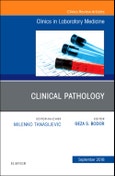This issue of Clinics in Laboratory Medicine will focus on Clinical Pathology and is edited by Geza S. Bodor. Topics include, but are not limited to, Steroid measurement / Salivary cortisol measurement, Protein testing by LCMSMS, LCMSMS in the Clinical Laboratory, Laboratory Standards for Clinical LCMSMS, The need to teach LCMSMS to clinical laboratory scientists, MALDI-TOF in the clinical laboratory, MALDI TOF MS in the clinical microbiology laboratory, LCMSMS method development consideration in clinical laboratory practice, Cancer diagnosis using mass spectrometry, Adulteration and LCMSMS drug testing, Diagnosis of inherited metabolic disorders using LCMSMS, Harmonization of LCMSMS protein assays, Vitamin D testing by LCMSMS versus by immunoassay, Pain management testing by LCMSMS, and Development of FDA approved clinical mass spectrometer.
Please Note: This is an On Demand product, delivery may take up to 11 working days after payment has been received.
Table of Contents
Preface: It's Mass Spectrometry's Turn to Change Clinical Practice
25-Hydroxyvitamin D Testing: Immunoassays Versus Tandem Mass Spectrometry
Pain Management Testing by Liquid Chromatography Tandem Mass Spectrometry
Matrix-Assisted Laser Desorption Time of Flight Mass Spectrometry
Proteoform Analysis to Fulfill Unmet Clinical Needs and Reach Global
Standardization of Protein Measurands in Clinical Chemistry Proteomics
Harmonization of Liquid Chromatography-Tandem Mass Spectrometry Protein Assays
Accreditation and Quality Assurance for Clinical Liquid Chromatography-Mass Spectrometry Laboratories
Liquid Chromatography-Mass Spectrometry Education for Clinical Laboratory Scientists
Special Considerations for Liquid Chromatography-Tandem Mass Spectrometry Method Development
Development of a 25-Hydroxyvitamin D Liquid Chromatography-Tandem Mass Spectrometry Assay, Cleared by the Food and Drug Administration, via the De Novo Pathway








